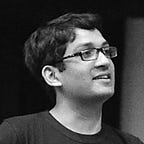The wonderful dreams of Mr Nilekani
The grand architect of digital India, Nandan Nilekani has been credited with transforming the country, taking it straight from the 19th to the 21st century. His 2008 thesis, “Imagining India” laid down the foundation of how technology has the potential to transform India. Mr Nilekani earned his stripes building one of the largest and most respected IT services companies in India — Infosys. Infosys offers engineers for hire to large banks and other mega corporations in the United States and other developed countries at a fraction of the cost it would take to hire these engineers in those countries. Since the delivery of software is purely digital, the limitations of the physical world seem to matter very little.
Armed with this stunning success and scale, Mr Nilekani imagined a transformed India that could bypass the physical world with technology for building a national ID. His flagship program Aadhaar has been hailed by politicians, experts and philanthropists across the world and now India is looking to “export” these “digital public goods” to the rest of the world.
With much fanfare in 2010, Ranjana Sonawane became the first Indian to receive the Aadhaar national ID. This was supposed to herald a new life for Ms Sonawane, but much to Mr Nilekani’s frustration the stubborn physical world refuses to fade away. When last interviewed in 2018, Ms Sonawane was still a daily wage worker who had to work 8–10 hours a day. “The Aadhaar number has not benefited me in any way” she concedes. Mr Nilekani also acknowledges this in his follow up book “Rebooting India”. But instead of trying to understand the real problems, he has a new list of “digital solutions” ranging from everything from digital health to digital education.
It is hard to find fault with Mr Nilekani, or most philanthropists for that matter. There is no doubt about their intentions. People who become dramatically successful tend to believe that their success gives them a special insight into the state of the world, and they would like to share this insight with the rest of the world. But they often forget that lessons learnt in one domain may not be transferable to other domains, and that the world remains a complex and dynamic place. The fluidity and dynamism of the software sector is rarely matched by the stubborn slowness of moving large chunks of atoms.
There is also no denying the dramatic benefits of “digital” transformation. I use the Mumbai local trains and it is so exciting to open the mobile app and just book a ticket without standing in the long lines, or being able to make digital payments on the fly. For people like me, who are at the top percentile of privilege, it is easy to forget that the long lines at the railway station still persist. Also that the digital services lie on top of a ubiquitous internet, thanks to billions of dollars of physical fibre optics and towers laid out by network companies.
It is often said that India lives in several centuries at the same time. Large parts of our cities are organised as highly compressed villages with makeshift housing and no modern facilities. While billions of transactions flow through the digital payment system, hundreds of millions suffer from chronic malnutrition. While toll collection at highways is now fully digitised, the state of the roads themselves seems as bad as ever, year after year. Some of the roads in India’s financial capital, Mumbai, seem horrible every monsoon. Some things just don’t seem to change.
The place that seems truly ahead in India, seems the state of Kerala. Every year, we take our annual summer break to my in-laws’ place in a sleepy, leafy town in the Malabar region. I am constantly surprised by the quality of living in the region. People are healthy, the roads are sturdy and the houses stunning. The people of Kerala don’t seem to need any “digital” transformation to make their lives better, but years of political accountability and investment in old fashioned education and social justice. Maybe software can’t solve everything.
Techno-solutionists keep inventing new panaceas for solving intractable problems. Their newest tool, Artificial Intelligence, won’t just solve cancer and climate change, but may also make the human race extinct. The indefatigable Mr Nilekani, not to be left behind, has started a new initiative People+ AI to bring this new transformative solution to the masses. Thinking of these brilliant imaginations standing near the open door of the Mumbai local, with a breeze blowing over my face, I can only smile.
—
ps. Some people felt that this article is more like an attack on Mr Nilekani than a broader criticism of techno-solutionism. My response to this is that Mr Nilekani is one of the most important public intellectuals in India and he actively evangelises his vision for more digital services in government. There is very little scrutiny apart from privacy rights activists, and this article is an attempt to question the amount of attention these solutions get over other more fundamental solutions to social problems. In the technology community, Mr Nilekani is hero worshipped. As a leading public figure, Mr Nilekani deserves more diverse scrutiny.
